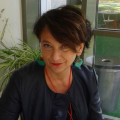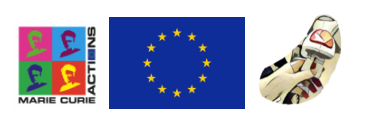
Support from digital technologies and social robotics to subjects with special educative needs
Description
The Summer Course is sustained by the MSCA-RISE H2020 project CybSPEED (Grant number 777720), which spans until the first of December 2021. This project involves beneficiaries and partners from Bulgaria, Greece, Spain, France, Chile, Japan and Morocco. Its coordinator is the Computational Intelligence Group of the Facultad de Informatica of the UPV/EHU. The general scope of the CybSPEED project is a study of the impact of social robotics in the educational support to children and young adults with special needs. The summer course scope broadens to a perspective that includes other digital technologies, such as smartphones and tablets. The course course explores the boundary between the traditional dramatization techniques, such as the puppet theater (teatar Tsvete) and the innovative interventions by means of anthopomorphic robots.
The target population are the subjects at risk of exclusion that may benefit from these new technologies as a support for their educational process with special needs. This population is composed of children/youg adults with conditions such as autism spectrum disorder (ASD), cognitive development deficits, reduced mobility, sensory deficits (auditive), and children in special situations, such as peadiatric-oncological patients. Given the diversity of the target population, their needs are also extremely diverse, so that the way the innovative technologies may be applied to treat them may change substantially among population sectors. For example, ASD subjects may react in quite diverse ways to the same technology, such as an antrhopomorphic robot. Reactions ranging from total repulse to social facilitation. Nowadays, research groups worldwide attempt to assess the impact of the exposure to these technologies on the sensitive children; asking questions such as: is there a novelty effect (i.e. the impact diminishes or dissapears with the habituation to the technology)?, which strategy is more effective for each target population stratum? The course aims to approach these questions addressing a wide audience, including families and caretakers, students and researchers from education, sociology and cognitive sciences, as well as engineers looking for life changing applications of technology.
The actual summer course proposal include representatives of associations that treat ASD persons (Gerardo Herrero, María Merino), pediatric-oncological patients (Nekane Lekuona, Dorella Scarponi), subjects with sensory disfunction (Ana Lekova) and at risk of exclusion (Lyuba Alboul). The technological aspect is covered by the Computational Intelligence Group (CIG) of the UPV/EHU. Although the summer course is proposed by the CIG, the emphasis of the course is on the social and educational aspects. We aim to present first the actual needs of the target population, and second the evidence that the innovative technologies and the social robotics resources may be of help to them.
Objectives
To introduce the educative intervention possibilities offered by the new digital technologies regarding subjects with autism spectrum disorders (ASD). Adaptability and personalization of these technologies. Presentation of evidences of their impact found up to this date.
To introduce the potential of social robotics for the development of social habilities from the programming point of view. Study case of young ASD adults. Presentation of evidences and experiences. The programmer point of view means that the subjects build and program the robots for specific purposes. It implies that the subject assumes a creative and managing role, aiming to achieve specific goals, instead of a passive espectator role.
To introduce the ludic, therapeutic and educative intervention using social robotics for subjects at risk of exclusion, pediatric-oncological patients, and children with sensory/motor deficits.
To introduce the attendants to a direct contact and experimentation of the discussed technologies in order to familiarize with them, and to be able to develop a critical assessment of their potential and limitations for the educational interventions.
Activity directed to
- University students
- Teachers
- Professionals
- All public
- Researchers
Program
10-06-2019
Entrega de documentación
“Presentación del curso, planificación y horarios, y breve reseña de los ponentes y los contenidos y metodología de las sesiones.“Presentation by the Director of the activity
- Manuel Graña Romay UPV/EHU - Catedratico de Universidad
“Personas con trastornos del espectro del autismo en el desarrollo cooperativo de proyectos robóticos : experiencias en la First Lego Ligue“
- Maria Merino Martinez Autismo Burgos - Apoyo psicosocial
Break
“Robotica social como herramienta para el analisis sicologico y psicoterapia de pacientes pediatrico oncologicos“
- Dorella Scarponi Universidad de Bologna - Psicoterapeuta especiaizada en pediatria oncologica
Sesion interactiva con robots sociales, demostraciones, preguntas y respuestas. Material facilitado por el grupo GIC de la UPV/EHU
Synthesis
11-06-2019
“Uso de tecnologías innovadoras en el TEA. Situación actual e investigaciones en marcha. Se analizarán las soluciones que cuentan con mayor respaldo científico desde la perspectiva de personas con TEA de diferentes perfiles, sus familias y profesionales.“
- Gerardo Herrera Gutierrez Universidad de Valencia - IRTIC - Senior researcher
“La robotica social como intervención ludico/terapeutica en pacientes pediatricooncologicos: experiencia de Aspanogi“
- Nekane Lekuona Amantegi Aspanogi - Apoyo Psicosocial
Break
“Sesión interactiva y conferencia sobre teatro terapéutico y dramatización con marionetas dirigido a personas con necesidades educativas especiales.“
- Violina Vasileva Aleksandrova Teatar Tsevete - Miembro de la compañia de teatro
12-06-2019
“Enhancement of Attention skills and Emotional regulation using EEG based Neurofeedback in Human-Robot-Interactions“
- Anna Lekova Intitute of Robotics, Bulgarian Academy of Science - Senior Researcher
“Sharing spaces with robots: how robotics can help to overcome barriers in social engagement and interaction.“
- Lyuba Alboul Sheffield Hallam University, Sheffield Robotics - Senior Researcher
Break
Round table: “Exploración participativa sobre las potencialidades y las limitaciones de las nuevas tecnologías en la integración educativa de personas con necesidades especiales“
- Manuel Graña Romay Universidad del Pais Vasco - Catedratico de universidad
- Gerardo Herrera Gutierrez IRTIC- Universidad de Valencia - Senior Researcher
- Maria Merino Martinez Autismo Burgos - Apoyo Psicosocial
- Nekane Lekuona Amantegi Aspanogi - Asistente Social
Directors

Manuel Graña Romay
Universidad del Pais Vasco, CCIA
Manuel Graña is a Full Professor in Computer Science and Artificial Intelligence at the University of the Basque Country (UPV/EHU). He is the actual coordinator of the CybSPEED european project funded by the H2020 MSCA-RISE call of the European Community with grant number 777720. This project is devoted to the research on the application of innovative cyberphysical systems to the pedagogical rehabilitation of children with special needs. His research interests include signal processing, computer vision, and machine learning for diverse applications. He has collaborated with researchers from a wide diversity of backgrounds, witha focus on applications of artificial intelligence in the neurosciences. He has advised more than 35 PhD students, and he is coauthor of over two hundred papers in high impact journals.
Speakers

Violina Vasileva Aleksandrova
Violina Vassileva - Aleksandrova is an actress, art therapist, theatrical pedagogue, part-time lecturer at Sofia University, expert and facilitator in many social projects. In 1990, she graduated from the National academy of theatre and film arts with “Puppet theater”. In 2005, she graduated her Master's degree at NBU with thesis on "The Role of Forum Theatre for managing anger in adolescence". She is currently a PhD student in "Special Pedagogy" at Sofia University "Kliment Ohridski". The topic of her thesis is "Prevention of violence at school through puppet therapy". Violina Vasileva is one of the founders of Theatre Tsvete Association in 1993, and since 2013 she is a Chairwoman of the Management Board of the Association. She has participated in more than 100 projects for non-formal civic education of adolescents and socialization of minority groups. She is experienced in working with disadvantaged children and young people without parents; minority groups; victims of violence.

Lyuba Alboul
Dr Lyuba Alboul is a mathematician with a strong fundamental training in Pure and Applied Mathematics and a broad research experience in Computer Science, Engineering and AI. Lyuba's research involves the interplay of discrete and continuous representation of reality, perception and interaction with real and virtual worlds, by both humans and machines. Lyuba has been involved in a number of research projects as a primary investigator. In 2007-2010, she has been co-investigator of the EU funded projects, GUARDIANS and View-Finder, where she has conducted research on 3D representation of reality by fusing several sensor modalities. She has been also an active participant in 'Engineering for Life', EPSRC funded project, where she focused on development 'human-centred' vision and measurement technologies for people with special needs, in particular on the autism spectrum.

Gerardo Herrera Gutierrez
Researcher at IRTIC University of Valencia. Author of different scientific publications in the field of autism. Editor of technical publications of Autismo Ávila and La Estrella Azul. Coordinator of different EU projects such as STAY-IN, AMUSE or SMAR-ASD. Director of different technological development projects for people with ASD, including Pictogram Room, Azahar (apps for communication and leisure), Supportive Eyes (training and tools on person-centred planning), A picture is worth a thousand words (DVD for skill training in supported-employment) or Speaking with Art (apps for gaining access to arts). Member of AETAPI (Spanish society for autism professionals). Brother of a woman with ASD, he is part of the Board of Autismo Avila and Autismo Castilla y León, also member of the patronage of Mira’m Foundation and Adapta Foundation.

Anna Lekova
Dr. Anna Lekova is currently Professor, Head of "Interactive Robotics and Control Systems" Department, Institute of Robotics (IR), Bulgarian Academy of Sciences (BAS), Sofia, Bulgaria. As the academic record, she was awarded PhD in 1995 in the field of Computing from Technical University - Sofia, Visiting Assistant Professor, Faculty of Computing, Technical University in 1990-1992, and Erasmus teacher in "Intelligent Wireless mobile networks” in the University of Portsmouth, UK, 2008-2013. She continued in Intelligent Interactions in Socially-assistive Robotics and contributed and organized more than 11 EU and national projects. She managed the very successful EEA Grand Project EU BG09 (2015-2016) “Methodologies and technologies for enhancing the motor and social skills of children with developmental problems”. In CybSPEED Project she studies how to translate the talent of actors and scenarists from art (puppe) therapy to robots by using modern technologies.

Nekane Lekuona Amantegi
Nekane Lekuona es asistente social en la asociación Aspanogi, Es una asociación sin ánimo de lucro fundada en 1996 cuya acción social comenzó en 1998 gracias a la iniciativa de 4 familias afectadas. La misión principal consiste en mejorar la calidad de vida del niño afectado de cáncer y de su familia y atender sus necesidades desde el momento en que se diagnostica la enfermedad. Gracias al esfuerzo de las familias, los profesionales, los voluntarios y las entidades colaboradoras, ASPANOGI ha conseguido mejoras significativas en la atención de los niños con cáncer. El apoyo psico-social que proporcionan la Trabajadora Social y la psicóloga de ASPANOGI, se desarrolla en el ámbito hospitalario y extra-hospitalario. Desde el 2007, se dispone de un despacho en el Hospital Donostia (4ºplanta azul del Materno Infantil), cedido por la dirección de dicho centro hospitalario.

Maria Merino Martinez
Maria Merino Martinez is a PhD in Sciences of Eduation. Garduated in Psichology from Universidad de Salamanca, and Psichopedagogy from UNED. She is the head of the program for integral Psichosocial Support for People with Austim Spectrum Disorders (APITEA) since 2006 in the Autismo Burgos association. She is lecturer in the Expert in Autism and Information technologies degree of the Universidad de Burgos. She is coordinator of the AETAPI interest group on woman and ASD. She is member of the research group BB on the use of ICT technologies for early detection of ASD of the Miradas Foundation. She is also member of the UBUINGENIO (FECYT) group on teh development of scientific and technologic talent in people with high capacities and ASD. Since 2013 she participates in the program First Lego League as coach of the group ASTI linked to the Autismo Burgos association. She has been research member of many i+D+i projects related to ASD.

Dorella Scarponi
Dorella Scarponi es graduada en Medicina y CIrugia, con una especializacion en Psicología Clínica. DOctorada en 2006 por la Universidad de Bologna con la tesis "Oncologia e Psicologia. Protocolli psicodiagnostici e psicoterapeutici nella pratica clinica". Sus intereses de investigación son: la infancia y la adolesciencia (psicologia y psicoterapia), genitorialidad (las fases criticas de la vida), los hermanos, el dolor mental, la separación y el luto. Posicion actual: RESPONSABILE DELL'INCARICO PROFESSIONALE DI ALTA SPECIALIZZAZIONE PSICOLOGIA E PSICOTERAPIA DEI PAZIENTI IN ETA' EVOLUTIVA AD ALTA COMPLESSITA' ASSISTENZIALE en el Policlinico S. Orsola-Malpighi, Bolonia.
Registration fees
| REGISTRATION | Until 31-05-2019 | Until 10-06-2019 |
|---|---|---|
| 81,00 EUR | 95,00 EUR | |
| 20,00 EUR | 20,00 EUR | |
| 48,00 EUR | 62,00 EUR | |
| - | 48,00 EUR |
Venue
Centro Carlos Santamaría
Plaza Elhuyar, 2. 20018- Donostia / San Sebastián
Gipuzkoa
Centro Carlos Santamaría
Plaza Elhuyar, 2. 20018- Donostia / San Sebastián
Gipuzkoa





